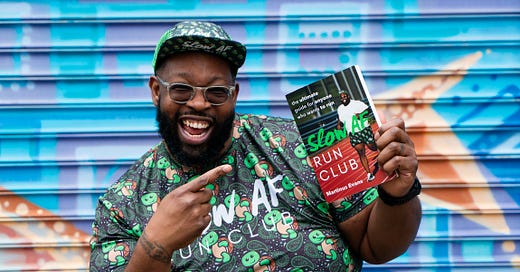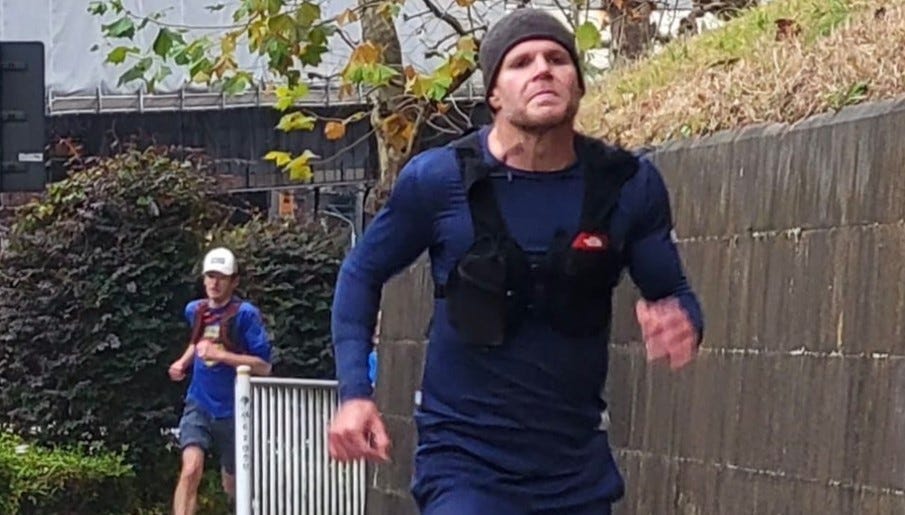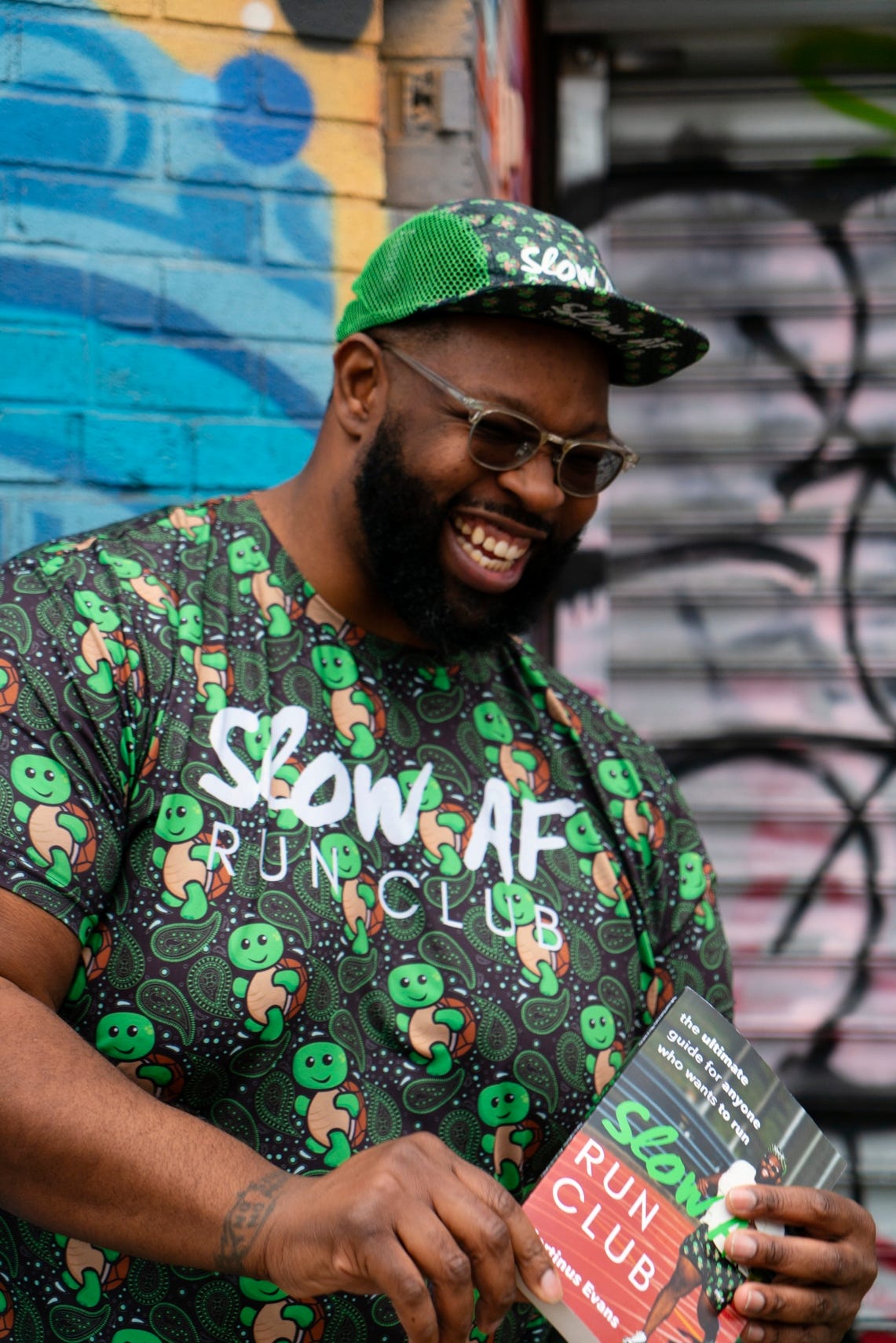Running Slow AF - The Martinus Evans story
How one doctor's fat shaming prejudice led to the formation of a running club looking to change attitudes throughout the world
Martinus Evans has a goal: to inspire one million people to start running in the body they have now.
Based on his own experience as a 300-pound (21 stone/136kgs) runner, Martinus’ mission is to make running into the inclusive sport it claims to be, but all too often falls short of.
The qualified running coach and founder of the Slow AF Run Club, a community with around 18,000 members worldwide, has completed eight marathons and hundreds of races.
It’s all a far cry from when a doctor branded him too fat to run and told him to “lose weight or die” back in 2012.
A furious Martinus responded by telling him he would run a marathon - something he achieved in Detroit less than 18 months later.
He told the Running Tales Podcast he had originally gone to the doctor as he was suffering from hip pain.
At the time he had been working as a suit salesman, a role which saw him on his feet for eight to 10 hours a day.
Although he didn’t do any running, Martinus was active - combining his job with life as a “weekend warrior,” playing basketball with friends and taking part in a flag [American] football league - a non-contact version of the sport.
But his doctor saw nothing except a ‘fat person’.
Martinus said: “He was like, “I know why you are in pain, you’re fat. You need to lose weight or die’.
“I’m sitting in the doctor’s office confused and angry because I had gone there because of hip pain.
“He went on to say I had the stomach of a pregnant woman, and needed to start walking on the track, all this stuff. I found that ridiculous because I was on my feet eight to ten hours a day at my job regardless. It wasn’t like I had a desk job.
“He was asking me to start walking on a track, so I went one better and told him ‘I’m going to run a marathon’.”
The doctor laughed at Martinus and said the pledge was “the dumbest thing he had ever heard in all his years of medicine,” but his prejudice was to change his patient’s life.
“I felt it was another example of fat phobia,” Martinus said. “You can be sitting in a doctor’s office with your eyeball falling out of its socket and if you’re a person of size they’ll be ‘we’ll get to the eye but let me tell you how fat you are and how the fatness in your head is pushing your eyeball out’.
“The cure for everything for a person of size can’t just be to lose weight.”
That was when Martinus’ running education began.
“I didn’t even know how long a marathon really was,” he said.
“For the longest time I was saying I’m going to run a 5k marathon. One of my running friends told me I had it all wrong, there’s no such thing as a 5k marathon.
“It was then that I was like, ‘I’m going to do it anyway. I don’t care what this doctor has said, I’m going to give it my best shot’.”
In the meantime, and partly thanks to running, Martinus’ hip problems had been resolved.
A different doctor had successfully diagnosed his pain, caused by the amount of time he had been on his feet at work, and referred him to physical therapy.
Once there, he told them of his new plan to run and a programme was started whereby he ran to physical therapy for eight to 10 weeks and they troubleshot any problems based on how he was feeling. In no time, the problem was resolved.
Martinus’ battles with the judgemental nature of some parts of the running and health community didn’t end there though.
He found a succession of fitness apps and plans, including the popular Couch to 5k plan, assumed that if he could run for half-an-hour he would reach 5k.
He said: “I’m thinking ‘who did the math’. You’re expecting me to run a 5k, over three miles, in under 10 minutes a mile.
“What sort of a beginner programme is that? It took me a little bit longer to understand I needed more time to do it and these training plans weren’t built for me.
“I also tried to hire a run coach, but no coach would take me on because of my size. They would tell me they were afraid to work with me because if I got injured they would be responsible.”
Ultimately, Martinus became so frustrated with the system he decided to become a coach himself - he’s since trained hundreds of people to achieve their goals.
From marathons to best selling books - how running changed Hannah Phillips' life
Running Tales: After all is said and run is a reader-supported publication. To receive new posts and support my work, consider becoming a free or paid subscriber. From a chance encounter with a “fat girl” wearing the same top as her to coping with the heartbreak of miscarriage, Hannah Phillips’ life has been changed and shaped by running.
By October 2013, Martinus was ready to take on his first marathon, completing the Detroit event in just under seven hours.
The experience was “bittersweet,” as he was heckled throughout by race volunteers: “There was a guy who kept telling me to ‘get on the bus, I’ll take you to the finish line’.
“He was just sowing seeds of doubt. I guess he found that funny as he just kept doing it.
“To go through that and still finish was bittersweet. It was ‘why did I have to go through this but also I did it’.
“Whenever people see a person of size that gives them the liberty to pick on them.
“At that point I thought the marathon was the worst thing ever - and I’m ready to sign up for another one.
“All of my inspiration and motivation is internal. What people say about me, what they do, doesn’t stop me.
“It actually fuels my fire to continue to keep running.
“I’ve always been the type of guy where if you want me to do something, piss me off and watch me do it.”
Also on Running Tales:
How 'Mr Slow Easy Comfortable' runs slower and lifts weights to go faster
Start with “stupid” and end in success… What does it take to complete a 145-mile race?
Bill McKim: The Olympic runner who needed a push to go to the Games
Martinus is keen to stress his journey is not a weight loss crusade. Instead, it is about embracing who you are and running in the body you have.
“There is this notion of being a good fat person,” he said. “A good fat person is actively trying to lose weight and not be fat.
“When people assume somebody is a good fat person, they are more happy for them versus a fat person who says I’m just trying to be active and if I don’t lose weight that’s ok.
“They look at that person like, ‘wait a minute, what do you mean you’re not trying to lose weight, you’re a bad fat person’.
“People make all these assumptions about you, like ‘you must be eating x, y, z in ice cream and cookies’ and that’s not necessarily the case.”
It’s an ideology Martinus took into the formation of the Slow AF Run Club, a community which aims to help the ‘back of the pack’ by providing inspiration and education, and letting people know they are not alone at races.
The group offers realistic running plans and size-inclusive merchandise, as well as a platform where people can get the encouragement they may not get a home.
It is in the process of launching a non-profit arm to start in-person groups.
Martinus said it is those people in the group, who may not conform to the “skinny, wiry” preconception of runners, who actually hold the balance of power in the future of the sport.
“It’s not elite athletes that pay for races, they don’t pay for shoes or clothes,” he said.
“They get everything for free. It’s slower individuals who are actually paying for this stuff.
“I think that for a long time the world has been celebrating super-fast runners, but we’re starting to be smarter consumers and to say if you’re not going to support us, to provide us with stuff we need, then we’ll go elsewhere.”
Thanks as ever for reading and listening to Running Tales. We couldn’t do this without your support - please back us to keep going by…







